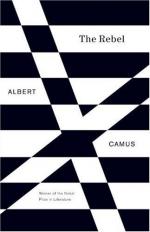
|
| Name: _________________________ | Period: ___________________ |
This test consists of 5 multiple choice questions, 5 short answer questions, and 10 short essay questions.
Multiple Choice Questions
1. According to Camus in Part 2, what "never has the patience to await complete control of the world?"
(a) Law of religion.
(b) Law of murder.
(c) Law of conflict.
(d) Law of power.
2. According to Part 1, remaining silent gives the appearance that one has no what?
(a) Opinions.
(b) Feelings.
(c) Tongue.
(d) Thoughts.
3. In Camus' introduction, what does he say "remains an exception"?
(a) Love.
(b) Murder.
(c) Passion.
(d) Philosophy.
4. Violence is directed at one and all in the service of what?
(a) An abstract idea.
(b) An unreasonable offer.
(c) An altrustic idea.
(d) An absolute value.
5. According to Part 3, The Social Contract is an inquiry into the legitimacy of what?
(a) Power.
(b) Religion.
(c) Rebellion.
(d) Justice.
Short Answer Questions
1. According to Part 3, monarchy wants to put what before justice?
2. The ancient regime monarchy was founded on what?
3. What two forms of rebellion are being considered in the book?
4. By what concept is metaphysical rebellion motivated by?
5. In Part 2, the maximum of enjoyment coincides with the maximum of what?
Short Essay Questions
1. Why did rebelling against nature equal rebelling against oneself for the ancients?
2. According to Camus in Part 3, why do men kill each other?
3. According to Camus in Part 5, what is the only way a rebel has of reconciling himself with his act of murder?
4. In Part 5, Camus explains the ambition for the desire for justice is what?
5. According to Camus in Part 3, how does a revolution based on principles destroy God?
6. According to Camus in Part 3, what coincides with the acceptance of iniquity?
7. How does Camus define a rebel in Part 1?
8. How does Camus connect murder and suicide in the Introduction?
9. According to Camus' Introduction, with what is ideology today concerned?
10. What does Camus say in Part 5 is the consequence of rebellion?
|
This section contains 594 words (approx. 2 pages at 300 words per page) |

|




